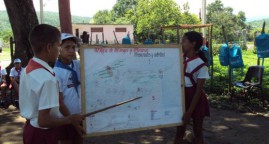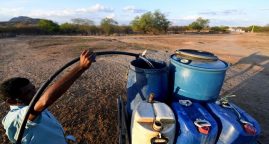Climate change at the centre of new global IFRC strategy
Article published on the IFRC website on 12/05/2019
Climate related shocks and hazards are amongst the major humanitarian emergencies confronting humanity today, according to a new decade-long strategy adopted by the International Federation of Red Cross and Red Crescent Societies (IFRC) today in Geneva.
Climate change emerged as a growing concern through an exhaustive two-year consultation with the entire Red Cross and Red Crescent network that led to the design of the new Strategy 2030. The process highlighted how climate change is a growing concern for nearly every single one of the 192 National Red Cross and Red Crescent Societies.
Speaking at IFRC’s 22nd General Assembly, which is currently underway in Geneva, IFRC President, Francesco Rocca, said:
“The message from our members and from our millions of volunteers couldn’t be clearer: climate change is an existential threat that is already completely altering the work we do, and the lives of the people we support.
“Tackling climate change will be our major priority over the coming decade. This means strengthening the capacity of each and every National Red Cross and Red Crescent Society so that they can effectively respond in their own contexts, as well as investing heavily in methods to help communities adapt.”
Strategy 2030 places ‘climate change and environmental crises’ at the top of a list of five global challenges that must be addressed in the coming decade. The other challenges identified in the strategy are ‘evolving crises and disasters’; ‘growing gaps in health and well-being’; ‘migration and identity’; and ‘values, power and inclusion’.
IFRC Secretary General, Elhadj As Sy, said:
“It is clear that the existing international humanitarian system will have to significantly transform to cope with climate related challenges.. Strategy 2030 is IFRC’s commitment to this transformation, as well as to the communities we live and work in.”
IFRC’s work to respond to climate change and environmental crises will involve a greater focus on identifying and addressing the drivers of vulnerability that are already being compounded by climate change. Ways in which IFRC can reduce these impacts – and even prevent them completely – include community strengthening, early warning systems, early alert, early actions , innovation and new forms of financing.
Related Articles
The Future of Securing Global Cities
03/22/2016. Making cities resilient against man-made crises and natural disasters is the key to the twenty-first century.
A Cuban model for a resilient Caribbean
02/25/2015. With a population of 36 million, the Caribbean region is home to a diverse array of languages and cultures… But for all its diversity, its countries and territories share an important trait – exposure to a yearly hurricane season that can, at times, have devastating impacts.
Vatican seminar on water pushes for better public policies
02/24/2017. A 2-day seminar aiming to propose much needed public policies for water and sanitation management is underway in the Vatican.






